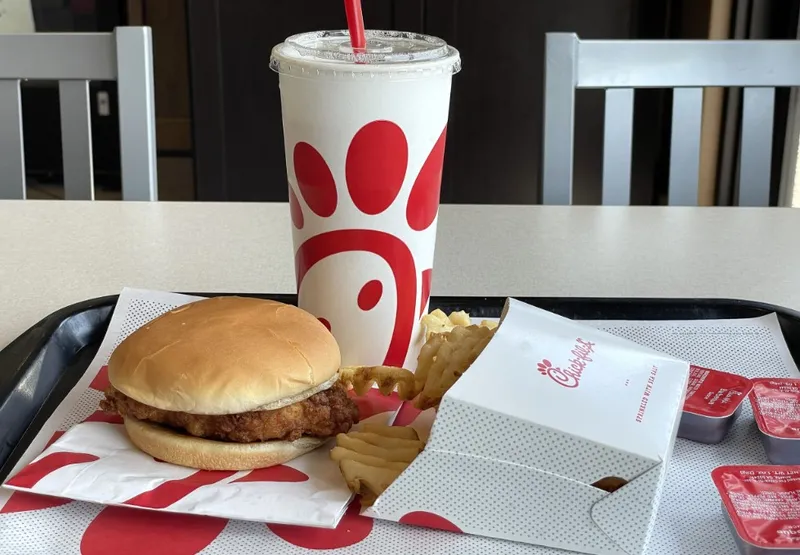Chick-fil-A, the popular fast-food chain known for its juicy chicken sandwiches and waffle fries, recently made headlines with a significant shift in their chicken policy. For years, the company prided itself on its “No Antibiotics Ever” (NAE) policy, ensuring that no antibiotics were used in raising their chickens.
However, starting in Spring 2024, Chick-fil-A will be transitioning to a “No Antibiotics Important to Human Medicine” (NAIHM) policy. This change has sparked a heated debate among customers and industry experts alike.

Chick-fil-A is changing its chicken
When it comes to fast food, few items are as beloved as Chick-fil-A’s chicken sandwich. Known for its juicy, tender white meat, perfectly seasoned and nestled between two buttery buns, it’s a comfort meal many rely on.
However, recent news has sent ripples through the Chick-fil-A community: the company is changing its chicken policy. If you’re a fan or just someone concerned about food quality, here’s what you need to know.
The Big Announcement
On March 25, 2024, Chick-fil-A announced a significant shift in its chicken sourcing policy. The fast-food giant will transition from its “No Antibiotics Ever” (NAE) policy to a new standard called “No Antibiotics Important to Human Medicine” (NAIHM) starting this spring.
This change means that while antibiotics important to human medicine will not be used, animal antibiotics can be administered if the chickens or those around them are sick. This is a departure from the stringent NAE policy that has been in place since 2014, which ensured that no antibiotics of any kind were used in raising the chickens.
Why the Change?
Chick-fil-A has cited supply chain issues as the primary reason for this shift. As the company looked to the future, it became clear that maintaining a consistent supply of high-quality, antibiotic-free chicken was becoming increasingly challenging. By adopting the NAIHM standard, Chick-fil-A aims to ensure a steady supply of chicken that meets its quality standards.
A spokesperson for Chick-fil-A explained,
“As we looked to the future, the availability of high-quality chicken that meets our rigid standards became a concern. This change enables us to not only ensure we can continue to serve high-quality chicken but also chicken that still meets the expectations our customers count on us to deliver.”
Source – https://www.chick-fil-a.com/our-chicken-commitment
Public Reaction
The announcement has sparked a significant backlash on social media. Many loyal customers are concerned about the potential health implications of using antibiotics in poultry. Some have even called for a boycott of Chick-fil-A products.
“Yeah, I have no problem with cruelty-free animal husbandry…but spreading unnecessary antibiotics is a clear public health risk. Stop eating their chicken,” one user tweeted.
Another user shared a screenshot of the Chick-fil-A app being deleted from their phone, stating, “It’s been a good run.”
Industry Context
Chick-fil-A is not alone in this shift. Last summer, Tyson Foods, America’s largest poultry company, also ended its eight-year pledge to keep antibiotics out of its chicken, citing similar supply concerns. About half of U.S. poultry farmers use some form of antibiotics to keep chickens healthy, especially in environments where disease can spread rapidly due to crowded and unsanitary conditions.
Antibiotics have been used in the poultry industry to promote growth and prevent disease. However, this practice has been under scrutiny due to the growing concern about antibiotic-resistant bacteria, which can pose significant health risks to humans.
Will the Chicken Taste Different?
One of the most pressing questions for many customers is whether this change will affect the taste of their beloved chicken sandwiches. According to Chick-fil-A, the fundamental quality and taste of the chicken should remain unchanged. The company continues to focus on serving real, white breast meat with no added fillers or artificial ingredients.
Conclusion
While Chick-fil-A’s decision to change their chicken policy has sparked controversy, the company maintains that this move is necessary to ensure a consistent supply of high-quality chicken for their customers. As the debate continues, it is important for consumers to educate themselves on the implications of antibiotic use in the poultry industry and make informed decisions based on their personal values and preferences.
Narayan Tripathi is a seasoned food writer and culinary enthusiast, renowned for his insightful and engaging content in the world of gastronomy. With a deep passion for exploring diverse culinary traditions and a keen eye for the latest food trends, Tripathi brings a rich tapestry of flavors and experiences to his readers.
